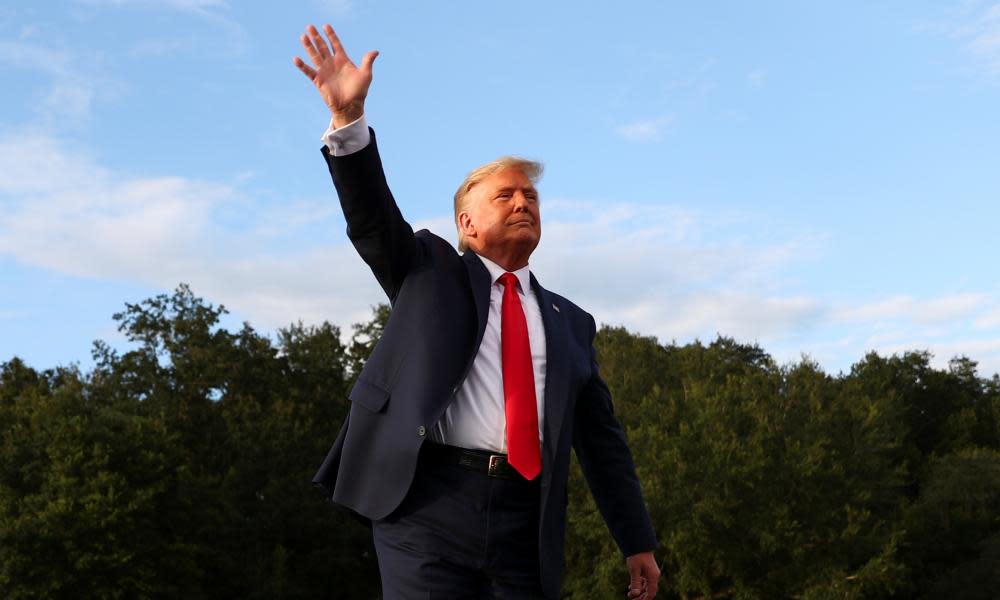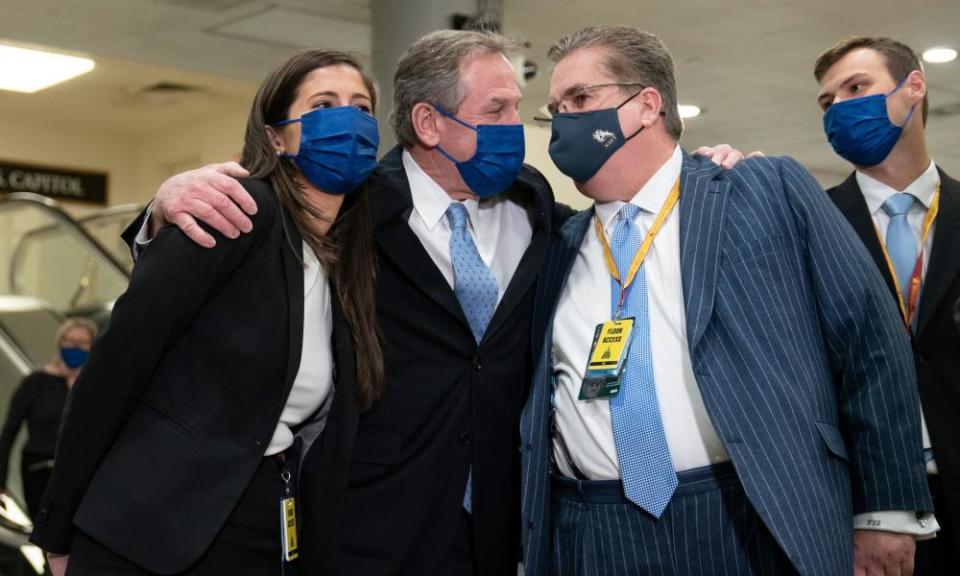Donald Trump acquitted in second impeachment trial

- Oops!Something went wrong.Please try again later.
Donald Trump has been acquitted by the Senate in his second impeachment trial for his role in the 6 January attack on the US Capitol – a verdict that underscores the sway America’s 45th president still holds over the Republican party even after leaving office.
Related: Democrats fail to secure enough votes to convict Trump in historic second impeachment trial - live
After just five days of debate in the chamber that was the scene of last month’s invasion, a divided Senate fell 10 votes short of the two-thirds majority required to convict high crimes and misdemeanors. A conviction would have allowed the Senate to vote to disqualify him from holding future office.
Seven Republicans joined every Democrat to declare Trump guilty on the charge of “incitement of insurrection” after his months-long quest to overturn his defeat by Joe Biden and its deadly conclusion on 6 January, when Congress met to formalize the election results.
The 57-43 vote was most bipartisan support for conviction ever in a presidential impeachment trial. The outcome, which was never in doubt, reflected both the still raw anger of senators over Trump’s conduct as his supporters stormed the Capitol last month – and the vice-like grip the defeated president still holds over his party.
Among the Republicans willing to defy him were Richard Burr of North Carolina, Bill Cassidy of Louisiana, Susan Collins of Maine, Lisa Murkowski of Alaska, Mitt Romney of Utah, Ben Sasse of Nebraska and Pat Toomey of Pennsylvania.
The swift conclusion of the Senate trial, only the fourth presidential impeachment in American history – and Trump’s second in just over a year – capped one of the most tumultuous chapters in the nation’s political history. Still shaken by the deadly riot that threatened America’s commitment to a peaceful transfer of power, senators of both parties were eager to turn the page.
Trump’s acquittal came after grave warnings from the nine Democratic House impeachment managers, serving as prosecutors, that Trump continued to pose a threat to the nation and democracy itself.
“If this is not a high crime and misdemeanor against the United States of America then nothing is,” congressman Jaime Raskin, the lead manager, pleaded with senators in the final moments before they rendered their judgments as jurors and witnesses. “President Trump must be convicted, for the safety and democracy of our people.”
From the outset, Trump’s allies in the Senate made clear they had no intention of convicting him. Though many Republicans explicitly supported – or implicitly indulged – Trump’s baseless claim of a stolen election, few defended his actions during the trial. Instead, they relied on a technical argument, advanced by his attorneys and rejected by a majority of the Senate as well as leading constitutional scholars, that the proceedings were unconstitutional because Trump was no longer in office.
In a floor speech after the vote, Senator Mitch McConnell, the minority leader, said Trump’s conduct preceding the assault on the Capitol amounted to a “disgraceful dereliction of duty” by the former president, who he held “practically, and morally, responsible for provoking the events of the day”
But McConnell concluded that the Senate was never meant to serve as a “moral tribunal” and suggested instead that Trump could still face criminal prosecution.
“President Trump is still liable for everything he did while he’s in office,” McConnell said. “He didn’t get away with anything yet.”
At a news conference after the vote, the House speaker, Nancy Pelosi, denounced as “cowardly” the Republicans who voted to spare Trump on procedural grounds and said she would refuse to entertain their calls for a censure.

“We censure people for using stationery for the wrong purpose,” she said, her voice rising in indignation. “We don’t censure people for inciting insurrection.”
Moments after the “not guilty” verdict was announced, a defiant Trump thanked Republicans who stood by him and decried what he called “yet another phase of the greatest witch-hunt in the history of our country”.
In his statement, Trump expressed no remorse and made no mention of the violence that unfolded in his name, but signaled his desire to remain a political force within the party.
“Our historic, patriotic and beautiful movement to Make America Great Again has only just begun,” he declared triumphantly.
Trump was the first US president to be impeached twice and is now the first president to be twice acquitted. The decision leave him free to pursue another tilt at the White House in 2024, though polling suggests the violent end to his presidency left his reputation badly damaged.
The House impeached Trump in his final days in office, on one charge of “incitement of insurrection” of the siege on the US Capitol. He invited supporters to Washington on the day electoral college votes were being counted, told them to “fight like hell” and encouraged them to go to the US Capitol, Democrats charged.
Once the attack on the Capitol turned deadly, placing Vice-President Mike Pence, members of Congress and Capitol Hill employees in danger, Trump violated his oath of office by failing to defend the US government against an attack, the impeachment article alleged.
The attack came after Trump spent weeks trying to overturn the results of the 2020 election. Five people died as a direct result of the assault, including a police officer, and scores more were seriously injured.
If this is not a high crime and misdemeanor against the United States of America then nothing is
Jamie Raskin
During their two-day presentation, prosecutors played harrowing and never-before-seen security footage of the attack to bolster their case that Trump had deliberately fomented insurrection by whipping up his followers, who believed they were acting on his instructions.
Crucially, they argued, the Capitol siege was not just a result of the speech Trump gave on 6 January but a “foreseeable” result after he spent years sanctioning violence among his supporters.
In a chamber protesters breached, the Democrats’ case was by turns emotional and visceral. It offered new insight into the scope of the violence that transpired, and senators learned for the first time how close the nation’s political leaders came to the mob that hunted them.
The striking evidence presented was a notable contrast to Trump’s first impeachment trial, which was built around documents and testimony regarding his effort to pressure Ukrainian officials to help him politically.
After Democrats concluded their arguments, Trump’s lawyers used just a fraction of the 16 hours allocated for their case. They used a smattering of approaches, arguing Trump could not be tried because he had already left office and that his speech did not amount to an incitement of violence and was protected by the first amendment.
During their brief presentation on Friday, Trump’s lawyers argued that he was using the same kind of rhetoric politicians frequently use and said the trial was a “political witch-hunt” and that Trump a victim of “constitutional cancel culture”.
Those arguments largely seemed to be an effort to distort the case against Trump and obscure the unique context under which he encouraged supporters to disrupt the activities of the US government as it facilitated the peaceful transfer of power.
The vote on Saturday came after the proceedings were briefly thrown into chaos when the House managers unexpectedly moved to call witnesses, in an effort to shed light on Trump’s state of mind as the assault unfolded. Caught off guard, Trump’s legal team threatened to depose “at least over 100” witnesses, and said Pelosi was at the top of their list.
After a frantic bout of uncertainty in which it appeared the managers’ request could prolong the trial for several more weeks, Senators struck a deal with the prosecution and Trump’s lawyers to avert calling witnesses. Instead, they agreed to enter as evidence the written statement of a Republican congresswoman who had been told that Trump sided with the rioters after the House minority leader pleaded with him to stop the attack on 6 January.
Related: The GOP representative at center of Trump impeachment trial drama
Embracing Trump’s combative and fact-bending approach, his lawyers declared him “innocent of the charges against him” and denounced the trial as a “final, desperate attempt” by Democrats to disqualify their most despised opponent from public office.
“You do not have to indulge the impeachment lust, the dishonesty and the hypocrisy,” Michael van der Veen, one of Trump’s lawyers, told senators.
With the result a foregone conclusion, the Democratic managers summoned the weight of history, reminding senators of the consequential votes taken by their forebears in the same chamber from abolishing slavery, to passing the Civil Rights Act and imposing sanctions on apartheid South Africa. Difficult in the moment, the managers said, these votes defined their legacies and changed the course of American history.
“There are moments that transcend party politics and that require us to put country above our party because the consequences of not doing so are just too great,” said one of the managers, Joe Neguse. “Senators, this is one of those moments.”

